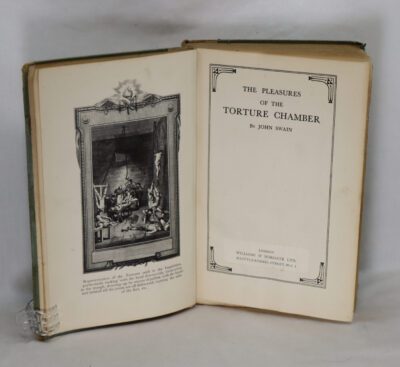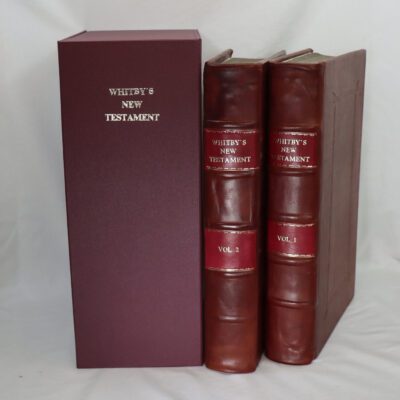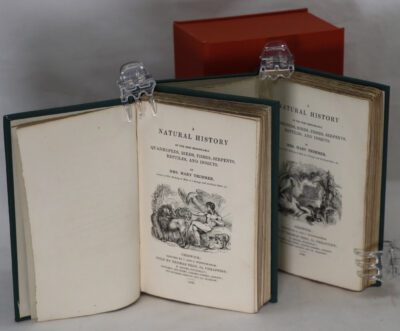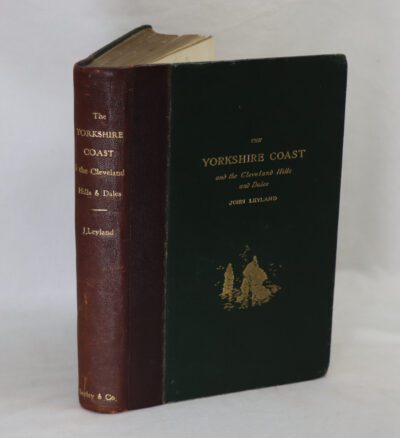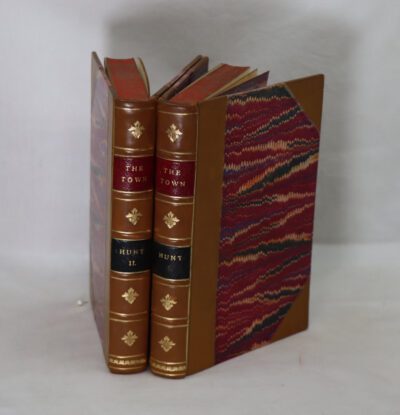The Art of Thomas Hardy.
By Lionel Johnson
Printed: 1894
Publisher: Elkin Mathews & John Lane. London
| Dimensions | 14 × 20 × 4 cm |
|---|---|
| Language |
Language: English
Size (cminches): 14 x 20 x 4
Condition: Fine (See explanation of ratings)
FREE shipping
Item information
Description
Full tan calf binding. Gilt banding on both boards. Brown title plate with gilt lettering and floral scrolling on the spine. Newspaper cuttings of Thomas Hardy inside.
It is the intent of F.B.A. to provide an in-depth photographic presentation of this book offered so to almost stimulate your feel and touch on the book. If requested, more traditional book descriptions are immediately available
An immaculate First Edition with ephemeral once treasured by a loving owner.
It is often forgotten that:
- Hardy trained as an architect in Dorchester before moving to London in 1862; there he enrolled as a student at King’s College London. He won prizes from the Royal Institute of British Architects and the Architectural Association. He joined Arthur Blomfield’s practice as assistant architect in April 1862 and worked with Blomfield on All Saints’ parish church in Windsor, Berkshire, in 1862–64. A reredos, possibly designed by Hardy, was discovered behind panelling at All Saints in August 2016. In the mid-1860s, Hardy was in charge of the excavation of part of the graveyard of St Pancras Old Church prior to its destruction when the Midland Railway was extended to a new terminus at St Pancras. Alongside his architectural bent Hardy was a good amateur artist both in a literal and metaphysical sense.
- Lionel Pigot Johnson (the writer of ‘The Art of Thomas Hardy’) was the cousin of Lord Alfred Douglas, the friend of Oscar Wilde.
- Oscar Wilde shared some similar interests to Hardy and both men are believed to have frequented London’s Rhymers’ Club. Hardy’s association with the Rhymers’ Club is sometimes given as one of the reasons for his estrangement from his first wife.
- The original custodian of this book and accompanying ephemeral frequented the Rhymers’ Club.
Thomas Hardy OM (2 June 1840 – 11 January 1928) was an English novelist and poet. A Victorian realist in the tradition of George Eliot, he was influenced both in his novels and in his poetry by Romanticism, including the poetry of William Wordsworth. He was highly critical of much in Victorian society, especially on the declining status of rural people in Britain, such as those from his native South West England.
While Hardy wrote poetry throughout his life and regarded himself primarily as a poet, his first collection was not published until 1898. Initially, he gained fame as the author of novels such as Far from the Madding Crowd (1874), The Mayor of Casterbridge (1886), Tess of the d’Urbervilles (1891), and Jude the Obscure (1895). During his lifetime, Hardy’s poetry was acclaimed by younger poets (particularly the Georgians) who viewed him as a mentor. After his death his poems were lauded by Ezra Pound, W. H. Auden and Philip Larkin.
Many of his novels concern tragic characters struggling against their passions and social circumstances, and they are often set in the semi-fictional region of Wessex; initially based on the medieval Anglo-Saxon kingdom, Hardy’s Wessex eventually came to include the counties of Dorset, Wiltshire, Somerset, Devon, Hampshire and much of Berkshire, in southwest and south-central England. Two of his novels, Tess of the d’Urbervilles and Far from the Madding Crowd, were listed in the top 50 on the BBC’s survey The Big Read.
Lionel Pigot Johnson (15 March 1867 – 4 October 1902) was an English poet, essayist, and critic. Johnson was born in Broadstairs, Kent, England in 1867 and educated at Winchester College. While at Winchester, Johnson became friends with Frank Russell, 2nd Earl Russell. The two started a lengthy religious discussion that Russell later published as Some Winchester Letters of Lionel Johnson (1919).
Johnson graduated from New College, Oxford, in 1890 and converted to Catholicism in June 1891. At that time, Johnson introduced Lord Alfred Douglas to his friend Oscar Wilde. He later repudiated Wilde in “The Destroyer of a Soul” (1892), deeply regretting that he initiated a love affair between the two men that devolved into a public scandal.
In 1893, Johnson published what some consider his greatest work, “Dark Angel”. During his lifetime, he published: The Art of Thomas Hardy (1894), Poems (1895), and Ireland and Other Poems (1897). Johnson was a member of the Rhymers’ Club, and cousin to Olivia Shakespear (who dedicated her novel The False Laurel to him).
Johnson died of a “cerebral haemorrhage” [Inquest, October 8, 1902] in 1902, after collapsing in the Green Dragon on Fleet Street in London. The story of Johnson’s being struck and killed by a hansom cab is a myth.
Legacy of Johnson
- In October 2018, Strange Attractor Press published Incurable: The Haunted Writings of Lionel Johnson, the Decadent Era’s Dark Angel, edited by Nina Antonia.
- Duncan Fallowell included Incurable in his list of books for the books of the year section (2018) in The Spectator.
- Michael Dirda, in his 5 December 2018 book review for The Washington Post, entitled “The ’90s are having a literary moment. That is, the 1890s… ” recommended Incurableas a must read.
- Eric Hoffman reviewed Incurable in the Fortean Times on 25 February 2019, saying “This handsome volume from the excellent Strange Attractor Press includes a lengthy, authoritative introduction by Antonia, which provides biographical and critical contexts…Incurable is an accessible introduction to the work of this minor, yet distinctive, poet.”
- On 1 May 2019 Alan Contreras reviewed Incurable in the Gay and Lesbian Review, saying Johnson’s: “writing conjured worlds of the imagination” and called Nina Antonia’s illustrated biography “masterful, gorgeously written and packed with carefully researched gossip.”
- In the table top war game Warhammer 40K the primarch of the Space Marine chapter the “Dark Angels” Lion El Johnson would appear to be named after Lionel Johnson and his Space Marine Chapter “the Dark Angels” a reference to his work “Dark Angel”
Lionel Johnson was a well-respected poet in his own right, and a literary scholar esteemed for his astuteness. Now known as ‘The Dark Angel’, Johnson was in the thick of literary society in England, being a member of the famous Rhymers Club, started by William Butler Yeats and Ernest Rhys. Members and attendees included Francis Thompson, Richard Le Gallienne, Ernest Dowson, Arthur Symonds, Lord Alfred Douglas, and Oscar Wilde. In fact, it was Johnson who introduced Douglas to Wilde. Douglas was Lionel Johnson’s cousin, and Johnson (himself a repressed homosexual) regretted immensely initiating the friendship, which was to have such socially and legally devastating results.
The Rhymers’ Club was a group of London-based male poets, founded in 1890 by W. B. Yeats and Ernest Rhys. Originally not much more than a dining club, it produced anthologies of poetry in 1892 and 1894. They met at the London pub ‘Ye Olde Cheshire Cheese’ in Fleet Street and in the ‘Domino Room’ of the Café Royal.
Those who took part also included Ernest Dowson, Lionel Johnson, Francis Thompson, Richard Le Gallienne, John Gray, John Davidson, Edwin J. Ellis, Victor Plarr, Selwyn Image, Lord Alfred Douglas, Arthur Cecil Hillier, John Todhunter, G.A. Greene, Arthur Symons, Ernest Radford, and Thomas William Rolleston. Oscar Wilde attended some meetings that were held in private homes. The group as a whole matched quite closely Yeats’ retrospective idea of ‘the tragic generation’, destined for failure and in many cases early death.
Along with the social element of the Rhymers’ Club, they published two volumes of verse. The first, entitled The Book of the Rhymers’ Club was published by Elkin Mathews in 1892. The Second Book of the Rhymers’ Club appeared two years later in 1894, published by the recently merged Elkin Mathews and John Lane. They had print runs of 450 and 650 respectively. Those of the group appearing in these two volumes were: T.W. Rolleston, John Todhunter, W.B. Yeats, Richard Le Gallienne, Lionel Johnson, Arthur Cecil Hillier, Ernest Dowson, Victor Plarr, Ernest Radford, Arthur Symons, G.A. Greene, Edwin J. Ellis, and Ernest Rhys.
This seemingly dualistic existence of the club (i.e., on one hand meeting informally at the Cheshire Cheese or in private homes; on the other hand, producing anthologies of verse) makes determining the club’s members rather tricky at times. There are certain poets who were known to have attended meetings but never had their verse appear in either of the books. Also, certain poets feature in one book without featuring in the other. What is certain is that all the members were men.
By the time Arthur Ransome wrote his Bohemia in London in 1907, the group had already passed into legend: “… the Rhymer’s Club used to meet, to drink from tankards, smoke clay pipes, and recite their own poetry”. In fact, Ransome’s research was less than thorough; the group continued to meet in some form until about 1904.
Oscar Fingal O’Flahertie Wills Wilde (16 October 1854 – 30 November 1900) was an Irish poet and playwright. After writing in different forms throughout the 1880s, he became one of the most popular playwrights in London in the early 1890s. He is best remembered for his epigrams and plays, his novel The Picture of Dorian Gray, and the circumstances of his criminal conviction for gross indecency for consensual homosexual acts in “one of the first celebrity trials”, imprisonment, and early death from meningitis at age 46.
Wilde’s parents were Anglo-Irish intellectuals in Dublin. A young Wilde learned to speak fluent French and German. At university, Wilde read Greats; he demonstrated himself to be an exceptional classicist, first at Trinity College Dublin, then at Oxford. He became associated with the emerging philosophy of aestheticism, led by two of his tutors, Walter Pater and John Ruskin. After university, Wilde moved to London into fashionable cultural and social circles.
As a spokesman for aestheticism, he tried his hand at various literary activities: he published a book of poems, lectured in the United States and Canada on the new “English Renaissance in Art” and interior decoration, and then returned to London where he worked prolifically as a journalist. Known for his biting wit, flamboyant dress and glittering conversational skill, Wilde became one of the best-known personalities of his day. At the turn of the 1890s, he refined his ideas about the supremacy of art in a series of dialogues and essays, and incorporated themes of decadence, duplicity, and beauty into what would be his only novel, The Picture of Dorian Gray (1890). The opportunity to construct aesthetic details precisely, and combine them with larger social themes, drew Wilde to write drama. He wrote Salome (1891) in French while in Paris but it was refused a licence for England due to an absolute prohibition on the portrayal of Biblical subjects on the English stage. Unperturbed, Wilde produced four society comedies in the early 1890s, which made him one of the most successful playwrights of late-Victorian London.
At the height of his fame and success, while The Importance of Being Earnest (1895) was still being performed in London, Wilde prosecuted the Marquess of Queensberry for criminal libel. The Marquess was the father of Wilde’s lover, Lord Alfred Douglas. The libel trial unearthed evidence that caused Wilde to drop his charges and led to his own arrest and trial for gross indecency with men. After two more trials he was convicted and sentenced to two years’ hard labour, the maximum penalty, and was jailed from 1895 to 1897. During his last year in prison, he wrote De Profundis (published posthumously in 1905), a long letter which discusses his spiritual journey through his trials, forming a dark counterpoint to his earlier philosophy of pleasure. On his release, he left immediately for France, and never returned to Ireland or Britain. There he wrote his last work, The Ballad of Reading Gaol (1898), a long poem commemorating the harsh rhythms of prison life.
Want to know more about this item?

Share this Page with a friend






